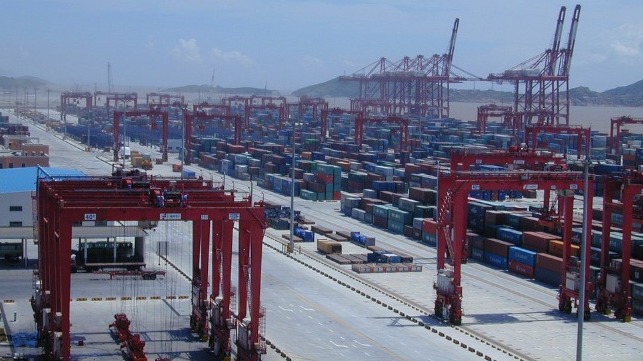A Fresh Perspective on Ports and Artificial Intelligence

There seems no end to the plethora of software solutions suddenly seeming to have acquired the quality of artificial intelligence (AI). Little more than a decade after phones reportedly grew "smart," you might now be wondering whether technology had crossed yet another historic threshold. For those of us who grew up watching 2001 A Space Odyssey and Knight Rider, the concept of non-human intelligence—whether benevolent or malevolent—is nothing new. Not only does science fiction fuel our expectations, it has often demonstrated an uncanny ability at predicting real life technological advancements. Is the age of artificial intelligence now upon us?
What actually is Artificial Intelligence?
Wikipedia describes artificial intelligence this way: "Artificial intelligence (AI) is intelligence demonstrated by machines, unlike the natural intelligence displayed by humans and animals, which involves consciousness and emotionality." An alternative source states: "Artificial intelligence (AI) is a wide-ranging branch of computer science concerned with building smart machines capable of performing tasks that typically require human intelligence." Put simply, AI is the endeavour to replicate human intelligence in machines. This makes artificial intelligence a very broad concept. Aside from the obvious lack of consciousness and emotionality that comes from a machine, artificial intelligence can mean pretty much anything that replaces what normally required human intelligence. You might be thinking that this has been occurring for decades—far longer than the current AI phenomenon. And you'd be right.
For a meaningful discussion on artificial intelligence, we need to consider what it means to those it's being marketed to. Which of their needs or expectations are being appealed to by those marketing systems boasting AI? Much of what we see and hear about artificial intelligence, after all, originates with software system providers—those with a vested interest in selling a product. Considered in this light, things become somewhat clearer. Generally, customers are expecting something capable of augmented decision making, at least matching but probably exceeding what an actual person is able to deliver. In light of this, let's reword the question raised at the beginning: Have we entered an era in which computer-based decision making will prove to be the difference between businesses that excel, and those that get left behind? This obviously includes ports.
To answer this, let's consider some simple truths.
What is real?
As humans we solve most of our problems using fast, intuitive judgments. Computers, on the other hand, employ algorithms to imitate simple step-by-step reasoning that humans use when solving puzzles or making logical deductions. There's a real difference between the two, and given that brain research has revealed only limited insights into how even basic thoughts get processed, efforts at closing the gap have been severely hampered. Consequently, the cognitive capabilities of current computer architectures are extremely limited, using only a simplified version of what intelligence is really capable of. The plain truth is that despite the brain's limitations, which we daily grapple with, to compare it with something as rudimentary as an electronic CPU and digital memory is egregiously wrong.
Does the apparent insurmountability in replicating human intelligence in a machine mean, however, that hardware and software engineers have reached the end of the road as to what is physically possible? Have we reached maximum 'smartness', so to speak? Far from it.
Without question computers have markedly improved over the years. Electronic processors (CPU) are vastly quicker today, and memory is faster, larger and cheaper. This has allowed software developers like myself to create ever larger and more complex applications, performing computations at speeds well beyond that of the brain. Whilst these gains don't in any way represent credible intelligence, they do however allow us to model the world in more expansive and detailed ways. Furthermore, we can dovetail and concurrently run larger numbers of algorithms. Paradoxically, this increased back-end sophistication has facilitated the creation of simpler and more intuitive user interfaces. This is because users are interacting with virtual models of the business domain, not raw data representations of it. And users just love it. It is this, coupled with advances in mobile device technology, that makes 2021 a truly exciting time to be involved in port related software systems.
All things considered, what is it then that really matters?
Not being swept along by unsubstantiated or unrealistic claims of artificial intelligence and machine learning certainly matters. Why? Because this distracts from what remains truly important when it comes to evaluating and implementing computer-based business tools. This begins with proper and complete requirements analysis, with well-grounded business objectives in mind. Too often overlooked, requirements analysis is the 80% of prep work that, as with a freshly painted home, largely determines the quality of the finish.
Flowing on from requirements analysis, appropriate modelling is another vital ingredient for any computer system intended to support complex, multi-party work environments such as ports or marine terminals.

that matters most
Get the latest maritime news delivered to your inbox daily.
In conclusion, the success of a software project has a great deal more to do with good requirements analysis and data modelling than any attempt at emulating intelligence. Therein lies the key message of this article. By remaining firmly focused on these few core areas, a port is more likely to achieve the goal of complementing a highly competent workforce with the best possible tools for the job.
Christopher Dodunski is the founder and lead developer of the MarineBerth port and marine terminal operating system (TOS).
The opinions expressed herein are the author's and not necessarily those of The Maritime Executive.
